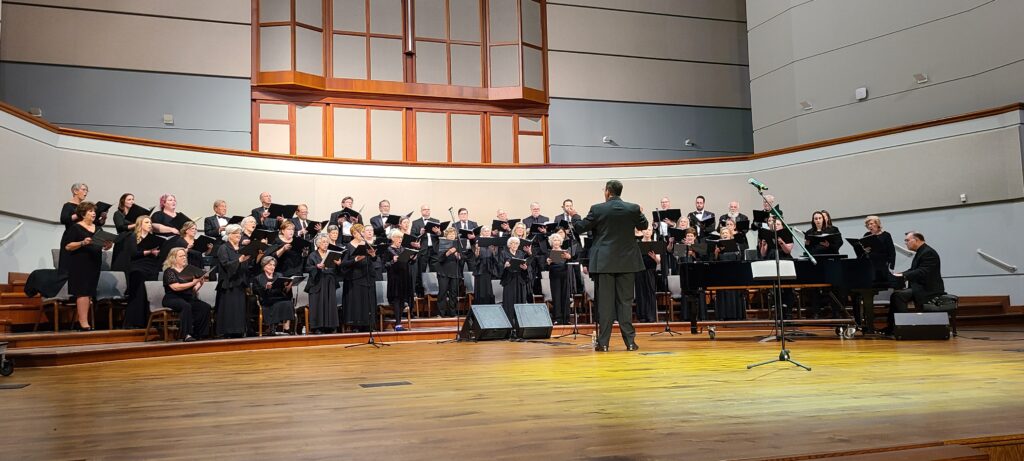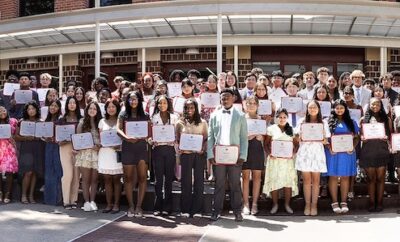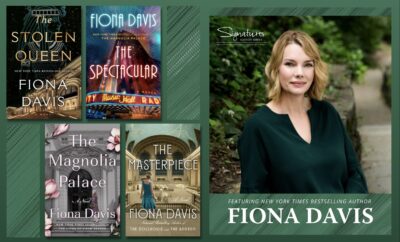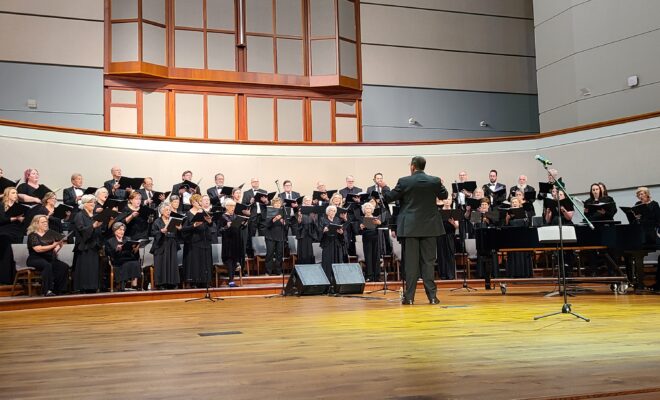 Photo Credit: Steve Powell
Photo Credit: Steve PowellEvents
Taking Risks and Realizing Dreams: Montgomery County Choral Society’s Emerging Composers Concert
When you and your friends hear the opening of your favorite video game, do you think about who wrote that music? Or when you’re binge-watching BritBox, who wrote all the songs? And those commercial jingles you either really love or hate – someone wrote those, too. For aspiring musical composers, getting their music heard is often an obstacle on their journey to success.
On Friday, March 18, the Montgomery County Choral Society took the stage for a special evening, dedicated to the music of emerging composers. As Dr. Robert Horton, the artistic director, quipped, “The ink isn’t dry on some of these pieces.” As First Methodist of Conroe’s sanctuary filled with people, two of the composers featured on the program moved throughout the crowd, welcoming family who had come to share the excitement, shaking hands with singers and other music educators and eager attendees. Excitement was in the air.
Conroe composer Travis Redden took the stage to tell his vision for his very recently composed setting of the Emily Dickinson poem, “Hope is the Thing With Feathers.” In the text, Dickinson reminds us that hope can be found even in the darkest of times, residing resiliently in the soul. Both the voices and the piano feature a recurring melody, the “tune without the words” of the poem. “Hope is the thing with feathers that perches in the soul, and sings the tune without the words. And never stops at all. And sweetest in the gale is heard; and sore must be the storm that could abash the little bird that kept so many warm. I’ve heard it in the chillest land and on the strangest sea. Yet, never in extremity, it asked a crumb of me.”
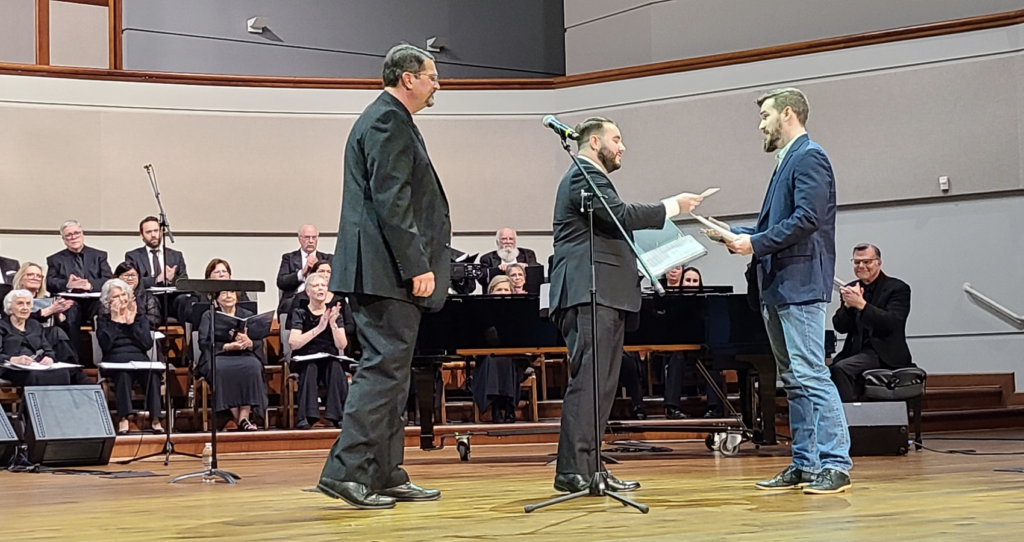
Asked afterward, Redden spoke about the journey of an emerging composer, saying “it looks a little different for everyone. This is especially true in modern times when composition doesn’t just equate to writing music for ensembles, but instead, can mean composing in mixed media formats or for film, television and even video games.” Redden said that he was just 16 when he picked up a guitar and fell in love with it. After beginning his music degree program at Sam Houston State University, he realized it wasn’t the instrument itself, but the conduit it represented for composition. It was the act of writing music that he truly loved. “The truth is I started composing before I even knew that composition was an option – I started writing music before I could even read music. I think all musicians are composers, singers, performers and teachers. We all have within us the capacity to wear any of these hats, but for me, the hat that seemed to fit the best was that of composer. What appeals to me most about being a composer is the storytelling component. In a way, music is just another language and as a composer, I get to use it to tell my stories.”
The second piece on the program, “Life’s Mirror,” was written in the midst of the pandemic. Composer and music educator Reginal Wright from Mansfield was present at the concert and took a few minutes to address the audience before the choir sang. “This piece was commissioned by Conroe Regional Choir during the beginning of the pandemic in 2020. Masks were an unprecedented development for all of us in education – students were caught in a mirror. My desire was to use music to plant seeds of hope. I had in mind the parable of sowing and reaping. As I developed the music, I chose a call-and-response form that moves through the various parts. The music also moves through a cycle of modulation, yet returns to the original key.” The lyricist for the piece is Madeline Bridges. She wrote: “There are loyal hearts, there are spirits brave. There are souls that are pure and true; then give to the world the best that you have. And the best will come back to you.”

In 2019, students in Los Angeles were given the opportunity to answer the question, “What would you like to tell the earth?” Three of the essays were chosen and a group of graduate students at Louisiana State University took on the task of setting those thoughts to music. Composer Mikeila McQueston, who is 24 years old, is one of those students and wrote “Dear World,” which is a collection of three pieces. McQueston addressed the audience via video. Dr. Horton chose one of the pieces, “I Will Bless You,” which says, “Dear World, I will plant flowers and I won’t litter. Dear World, I will pick up the things that are in my backyard. I want to please you. It would be my honor. Dear World, I will be polite by picking up in the grass. I will bless you. I love you, World.”
Soprano Andrea Horton presented excerpts from another McQueston composition, “Lucy Boyd,” a monodrama composed in 2018. Horton is a colleague and friend of McQueston. “Lucy Boyd” was inspired by the story of Pulitzer prize winning poet Edna St. Vincent Millay’s early childhood, which was filled with both an abusive environment and a trunk full of books. The four movements of “Lucy Boyd” are “Elegy,” “Sometimes I Look Up,” “You Know…” and “Assured.” As the solo voice soars through the movements, the story unfolds of processing grief, reconciliation, and acceptance that the heroine cannot change the past, but she can move on with peace.
Soprano Lindsey Von Holten followed with composer Michael Patterson’s 2020 piece, “The Shattering,” which premiered at the concert as a set. Patterson is quoted as saying, “‘The Shattering’ is a musical setting of three of Millay’s poems. The inspiration for this project was a recollection from her poem #11, “Spring is here; and so ’tis Spring… But not in the old way.” Patterson continues, “I found the sentiment of all three poems relative to this terrible pandemic of 2020.” Millay wrote in a second poem, “The First Rose”: “The first rose on my rose-tree budded, bloomed and shattered. During sad days when to me nothing mattered. Grief of grief has drained me clean. Still it seems a pity no one saw – it must have been very pretty.” And the last poem in the set is, “The Dogwood Blossoms.” It begins, “All the dogwood blossoms are underneath the tree! Ere Spring was going – ah, Spring is gone! And there comes no Summer to the like of you and me – blossom time is early, but no fruit sets on.”
The last of the emerging composers was Kim Andre Arnesen who wrote, “Flight Song,” with lyrics by Euan Tait, a Scottish poet. The piece, which speaks to the human journey, was composed as a gift for the St. Olaf Choir in Minnesota, and it has since traveled around the world. Many in the audience were familiar with this piece, which has recently been sung by region choirs. Tait wrote: “Like a feather falling from the wing, fragile as a human voice. Afraid, uncertain, alive to love. We sing as love. Afraid, uncertain. Yet our flight begins as song.”
For Redden, and for all the emerging composers, what did the Emerging Composers Showcase and the opportunity to share their music mean? Redden received an award from the Choral Society for “Hope is the Thing With Feathers,” so that was an immediate benefit. But beyond that? Redden said, “One of the most challenging things as a composer, besides writing good and accessible music, is finding groups willing to take a risk on your music. As composers, if we want to market ourselves, apply to doctoral programs, workshops, camps, or jobs in the film or video game industry, we have to have good recordings of our music. It’s a challenge to get those recordings if most groups would rather program Brahms. No disrespect to Brahms, of course, but the propensity of groups to program “safe” pieces from established composers poses quite the challenge to new musicians. All of this to say that there aren’t words with enough gravity to express how important emerging composer concerts like this are. What the Montgomery County Choral Society is doing for composers is incredible, and I am truly grateful.”.
Horton took a moment to put the evening of choral music in context. “Two years ago, the world of choral music shut down. There was no music, even church music, in person. Sadly, we all recall the feeling that being together, singing together, could be deadly. For the Montgomery County Choral Society, tonight is a victory. Last May, we did the unthinkable: we held a concert in person at the Willis High School auditorium. Then we had a concert here in October with two school groups, then the Messiah sing-along at Christmas, and now the Emerging Composer Showcase, which includes a world premiere. We must remember how far we’ve come. Tonight will move choral art forward.”
The Montgomery County Choral Society invites everyone to join them for their 50th anniversary Grand Final Concert on May 16, 2022, at 7 pm at First Methodist of Conroe. The concert will feature American composer Dr. Dan Forrest’s “Requiem for the Living.” Learn more at the Montgomery County Choral Society website at www.mcchoral.org or Facebook page @montgomerycountychoralsociety.
